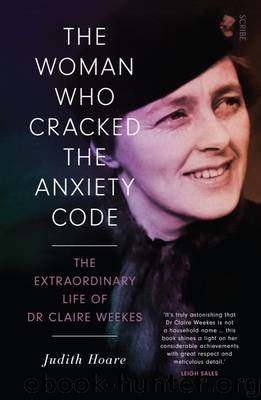The Woman Who Cracked the Anxiety Code by Judith Hoare

Author:Judith Hoare
Language: eng
Format: epub
Tags: BIO017000, PSY000000, HEA000000, PSY036000, MED102000, PSY008000, PSY022060, SEL024000
Publisher: Scribe Publications Pty Ltd
Published: 2019-09-11T16:00:00+00:00
Chapter 18
Self Help for Your Nerves
On 10 November 1962, the first review was published in The Sydney Morning Herald. It did not start well.
I must admit I approached Dr Weekes’s book with both scepticism and misgiving. The title, to begin with, is mildly irritating; it smacks not only of the ‘do-it-yourself’ craze which has proved so commercially profitable in recent years, but of the verbose treatises on salesmanship which strew our bookshops and libraries.
Does not one feel heartsick, too, at the strident emphasis of the book’s third sentence? ‘THE ADVICE GIVEN HERE,’ says Dr Weekes, and the capitals are hers, ‘WILL DEFINITELY CURE YOU, IF YOU FOLLOW IT.’ Furthermore, on the second page, no fewer than three phrases are italicised for added emphasis. It is not a promising beginning.
The reviewer, Robert Bell, persevered, however, and his initial aversion turned to grudging admiration. ‘Read on, I suggest. There is nothing, as President Roosevelt claimed thirty years ago, to fear but fear itself! The book’s title turns out to be a completely accurate description of its contents, and the reader will be very speedily impressed by Dr Weekes’s obvious professional competence.’
Bell saw value in the book for the general reader, ‘even those whose nerves are under control’. He provided a neat synthesis of her explanation of the nervous system and the tricks it could play, and revealed her six-word panacea: Facing, Accepting, Floating, Letting Time Pass.
Bell got the idea. You don’t fight, but yield. He approved of her dismissal of brisk tough talk such as: ‘It all depends on you’ and ‘Your recovery is in your own hands — it’s up to you’. ‘A great deal of harm has been done by such advice,’ he averred.
In his penultimate paragraph, he acknowledged her medical qualifications as a consulting physician at the Rachel Forster Hospital, and concluded that Weekes had written an ‘admirably lucid exposition of the subject. It is serious of purpose and will be of help to those who have vainly sought a cure for nerves.’
Yet the reviewer couldn’t quite let go of the idea that Weekes lacked credentials. ‘But should her prescription, so persuasively argued, be used by sufferers without at least an initial expert diagnosis and advice?’ Bell advised seeking out an experienced psychiatrist to get more individual attention.
Weekes had no way of explaining that, as a senior physician, she had been consulted as an ‘expert’ by patients who had been referred to her by their doctors for years, nor that the point of her book was to meet the needs unmet by psychiatry. Bell’s response was her first introduction to what would become a persistent theme. Individuals who read her books or listened to her audios would be overwhelmed with gratitude, professionals with indifference, or worse.
The press coverage nonetheless started to build favourably. On 18 November 1962, eight days after Bell’s review, The Sydney Morning Herald published a full-page article under the headline ‘You and Your Nerves. “A Sydney doctor answers the question: what makes a nervous breakdown?”’
Weekes had
Download
This site does not store any files on its server. We only index and link to content provided by other sites. Please contact the content providers to delete copyright contents if any and email us, we'll remove relevant links or contents immediately.
The Art of Thinking Clearly by Rolf Dobelli(8882)
Mindhunter: Inside the FBI's Elite Serial Crime Unit by John E. Douglas & Mark Olshaker(7860)
Change Your Questions, Change Your Life by Marilee Adams(6675)
Nudge - Improving Decisions about Health, Wealth, and Happiness by Thaler Sunstein(6651)
Mastermind: How to Think Like Sherlock Holmes by Maria Konnikova(6264)
The Power of Now: A Guide to Spiritual Enlightenment by Eckhart Tolle(4781)
Men In Love by Nancy Friday(4355)
Factfulness: Ten Reasons We're Wrong About the World – and Why Things Are Better Than You Think by Hans Rosling(4036)
The Confidence Code by Katty Kay(3582)
Thinking in Bets by Annie Duke(3547)
Man and His Symbols by Carl Gustav Jung(3336)
The Worm at the Core by Sheldon Solomon(2937)
Three Women by Lisa Taddeo(2928)
Why Buddhism is True by Robert Wright(2845)
Liar's Poker by Michael Lewis(2825)
The Inner Life of Animals by Peter Wohlleben(2779)
Descartes' Error by Antonio Damasio(2753)
The Power of Mindful Learning by Ellen J. Langer(2720)
The Slow Fix: Solve Problems, Work Smarter, and Live Better In a World Addicted to Speed by Carl Honore(2581)
